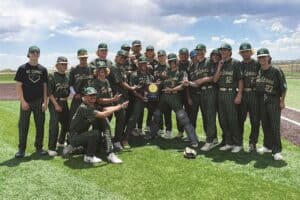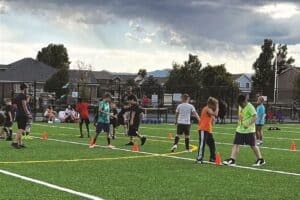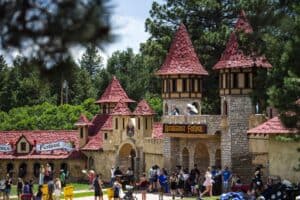The Niobrara shale formation, which is partially located in eastern El Paso County, contains highly coveted deposits of oil and natural gas. As several oil and gas companies seek permits to drill, some residents are concerned about the safety of their private wells.Protect Our Wells, a nonprofit organization for private well owners, held a meeting in March at the Meadow Lake Airport hangar to address the issues. Dr. Robert Raynolds, a research associate from The Denver Museum of Nature and Science, was the featured speaker.Raynolds said an oil and gas company is supposed to get permission from the landowner to drill, but that isn’t always the case. If the mineral rights have been severed, there isn’t much the landowner can do to stop the drilling, he said.If the mineral rights have not been severed, the landowner can choose whether to lease his or her property to the company for drilling.However, in either case, Raynolds said a company must first get a special use permit from the county before they drill a production well, and the permit process requires a public hearing. If the hearing favors the oil and gas company, the landowner doesn’t have the power to stop the drilling.Protect Our Wells president Sandra Martin said, “People need to know if their mineral rights have been severed or not. They need to watch out for the possibility that the legal documents may allow them to come onto your property and drill without your permission.”Currently, there is no drilling in El Paso County, but Martin and Raynolds urged residents to research the status of their mineral rights since it is possible that companies could begin drilling exploratory wells without the property owner’s approval.If an oil and gas company receives permission to drill; and, through exploratory drilling, decides to set up a production well; the concern then is groundwater contamination, Martin said.Raynolds said the aquifers in the Denver Basin (the source of Falcon well water) are relatively shallow. Most wells, he said, are about 800 feet or less. According to the U.S. Geological Survey, the estimated 520 million barrels of oil and .95 trillion cubic feet of natural gas deposits in the Niobrara formation are at a maximum depth of 4,680 feet. Subsequently, oil and gas companies need to drill through the aquifer to get to the Niobrara deposits. The distance between the aquifer and the targeted deposits is so great there is little, if any, risk of contamination from the deposits themselves, Raynolds said.But there is concern that the process of drilling through the aquifer could cause contamination. “Our biggest concern is that when they drill they have to go right through our drinking water, and if something happens, your property is pretty much worthless,” Martin said. Raynolds said that during the drilling process casings are used to separate the aquifer and the drill bore, which adds a safety measure for extraction but doesn’t eliminate all risk of contamination. “It isn’t impossible that engineering stuff won’t break,” Raynolds said.Another concern are the fluids used to break open the rock and release the targeted oil and natural gas through a process known as hydraulic fracturing or fracking. According to The American Petroleum Institute, the fluids used in fracking consist of 99.5 percent water and sand, as well as other materials specific to the company doing the fracking and the type of rock being fracked. Raynolds said the other materials used in fracking aren’t well-controlled, and the Safe Drinking Water Act of 2005 exempts fracking fluids from regulation.”It only takes one mistake,” Martin said. “Do you want to be the one to have the problem; and, if you are, make sure you have things in place to cover yourself. We know that people will sign these leases, but they need to negotiate it so they’re protecting themselves.”Raynolds said he agreed with Martin. However, he said people need to know that even if they sign a lease to allow drilling, it doesn’t mean any drilling will take place. “The challenge for people to understand is that drilling is a culmination of a series of events,” Raynolds said. “If a company decides to drill, they’ll make the necessary arrangements and pay the willing participants to make it happen. We can’t just hide and pretend like it isn’t going to happen.”Raynolds said he didn’t intend to persuade or advise anyone; he simply wanted to inform the community.Martin said Protect Our Wells is planning a follow-up meeting in late May or early June to provide information about negotiating with drilling companies to ensure protection.Visit http://protectourwells.org for more information.







